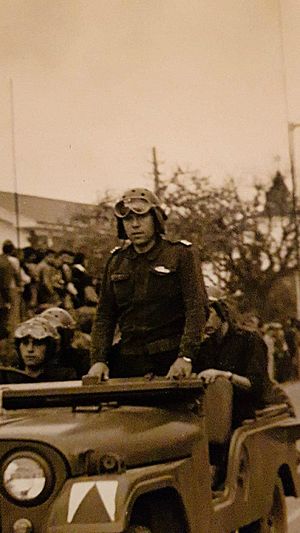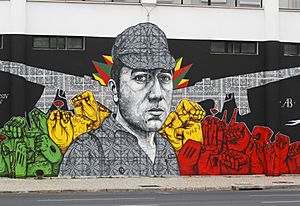Salgueiro Maia facts for kids
Quick facts for kids
Fernando José Salgueiro Maia
|
|
|---|---|

Capitão Salgueiro Maia
|
|
| Born | 1 July 1944 Castelo de Vide, Portugal |
| Died | 4 April 1992 (aged 47) Santarém, Portugal |
| Allegiance | |
| Service/ |
|
| Years of service | 1964–1988 |
| Rank | Captain Major (from 1981) |
| Battles/wars | Portuguese Colonial War
|
| Awards | Grand Cross of the Order of Liberty Grand Officer of the Military Order of the Tower and of the Sword, of Valour, Loyalty and Merit Gold Medal of the city of Santarém Grand Cross of the Order of Prince Henry |
Fernando José Salgueiro Maia (born July 1, 1944 – died April 4, 1992) was a brave captain in the Portuguese Army. He is famous for his important role in the Carnation Revolution. This event peacefully ended a long-lasting dictatorship in Portugal. People often call him Salgueiro Maia.
Contents
Salgueiro Maia's Early Life
Salgueiro Maia was born in 1944 in Castelo de Vide, Portugal. His father, Francisco da Luz Maia, worked on the railway. His mother was Francisca Silvéria Salgueiro.
He went to primary school in São Torcato, Coruche. Later, he moved to Tomar to study at Colégio Nun'Álvares. He finished his high school education in Leiria. Maia also studied Social and Political Sciences, and Ethnological and Anthropological Sciences.
Leading the Carnation Revolution
In 1974, Salgueiro Maia was one of the army captains who led the Carnation Revolution in Portugal. He was a young captain stationed in Santarém. He trained officers and sergeants there. He learned about the plans of the Movement of the Armed Forces (MFA) to end the dictatorship.
Maia's Mission in Lisbon
Maia's special job was to take control of "Vienna." This was the government area in the center of Lisbon, the capital city.
All his soldiers volunteered to join him. They left in military vehicles for Lisbon, which was about 60 kilometers away. They arrived at the government area around 6 AM.
Winning Over Other Forces
The old government quickly tried to get its own soldiers to fight back. But Captain Maia was very good at talking to people. He convinced these soldiers to join the revolution instead.
There was another attempt to attack the revolutionary forces from a navy ship. But the sailors on the ship refused to fight. They even threatened to use their own cannons against the ship if it tried to attack Maia's forces.
The Peaceful Surrender
After this, the government ministers left their offices. They went to a military barracks. Maia's forces surrounded the barracks. They fired some shots to show they were serious.
Finally, Maia helped arrange for the Prime Minister to surrender to General Spinola. Maia then led the former government officials away. Crowds cheered "Vitória!" (Victory!) as they passed.
Salgueiro Maia and his troops made the dictatorship step down peacefully. There was no bloodshed from the revolutionary side. The only four deaths during the Revolution were caused by PIDE, the old government's secret police. This happened when people were protesting outside their building in Lisbon.
Why Red Carnations?
Red carnations became a symbol of this peaceful revolution. Some of Maia's soldiers and civilians asked a flower seller for flowers. They put these flowers in the barrels of their guns and tanks. This was a sign that they wanted no fighting or bloodshed.
Life After the Revolution
After the revolution, Salgueiro Maia did not want any political power. He became a major in the army in 1981.
He later adopted two children. In 1989, he was diagnosed with cancer. He passed away three years later, on April 4, 1992, when he was 47 years old.
In the 2000 movie Capitães de Abril, which is about the Carnation Revolution, the Italian actor Stefano Accorsi played Salgueiro Maia.
Awards and Honors
Salgueiro Maia received many important awards for his bravery and service:
- In 1983, he received the Grand Cross of the Order of Liberty.
- In 1992, after his death, he was given the Grand Officer of the Military Order of the Tower and of the Sword, of Valour, Loyalty and Merit.
- In 2007, he received the Gold Medal from the city of Santarém.
- In 2016, he was given the Grand Cross of the Order of Prince Henry.
See also
 In Spanish: Fernando José Salgueiro Maia para niños
In Spanish: Fernando José Salgueiro Maia para niños


